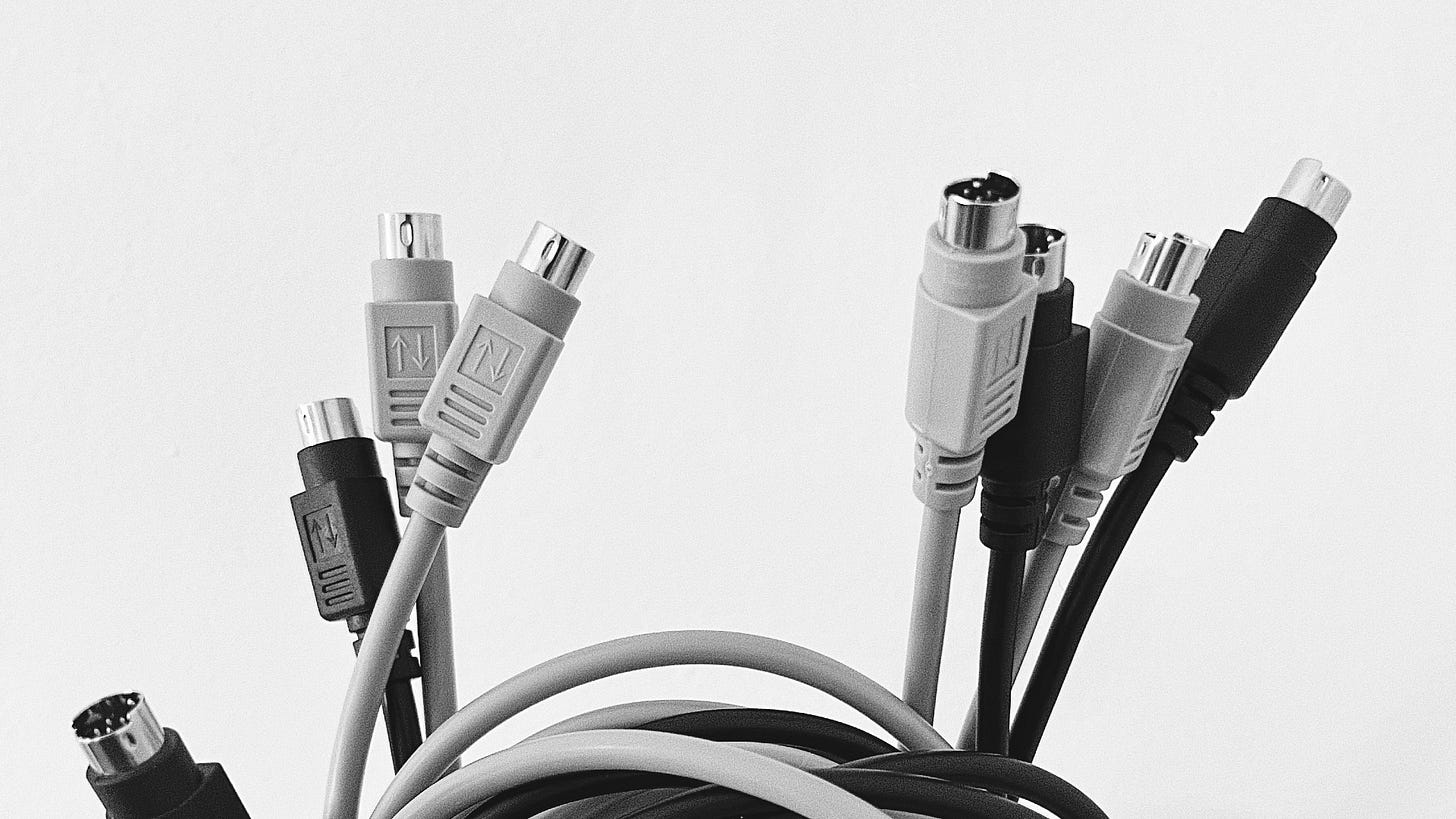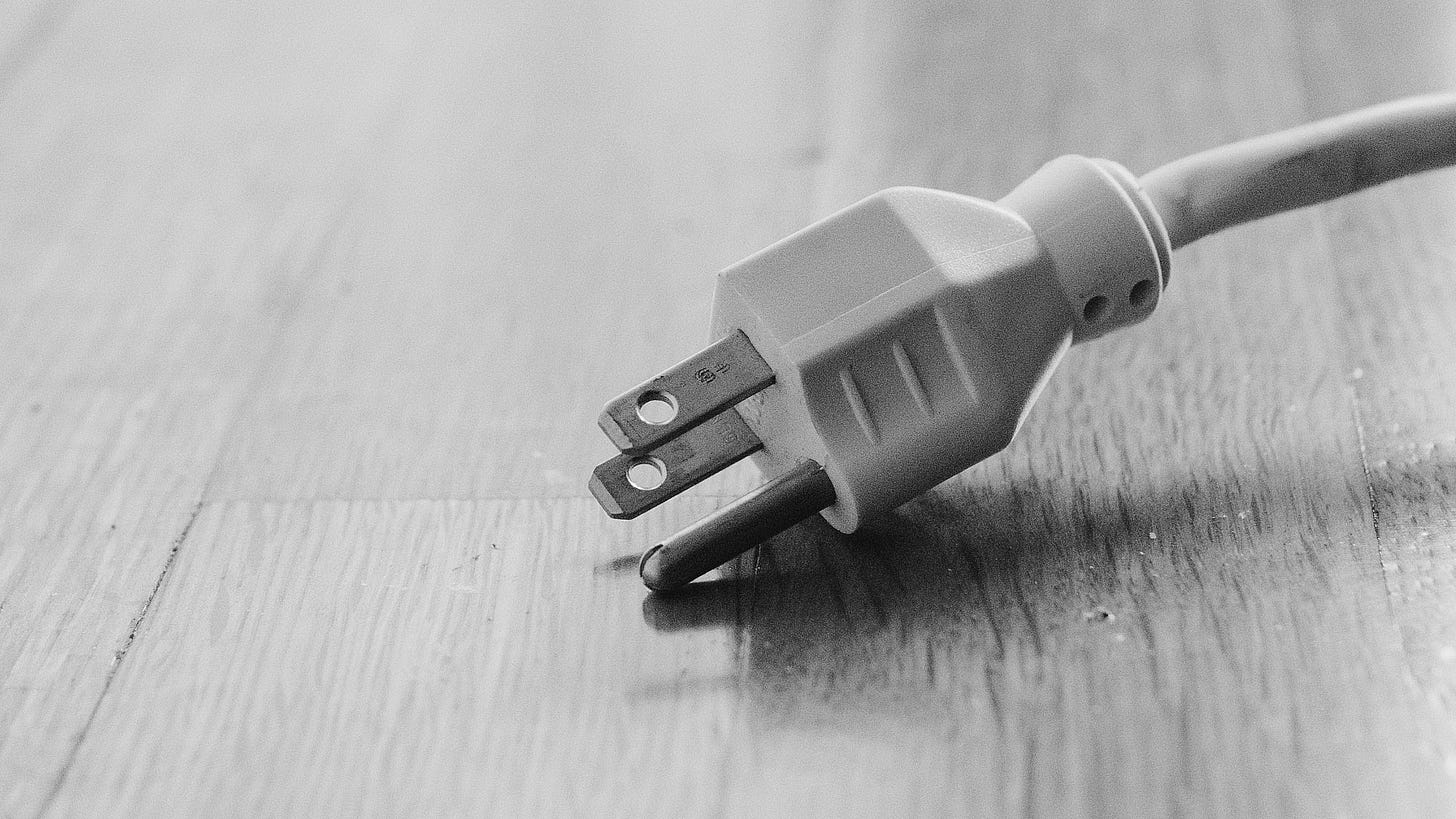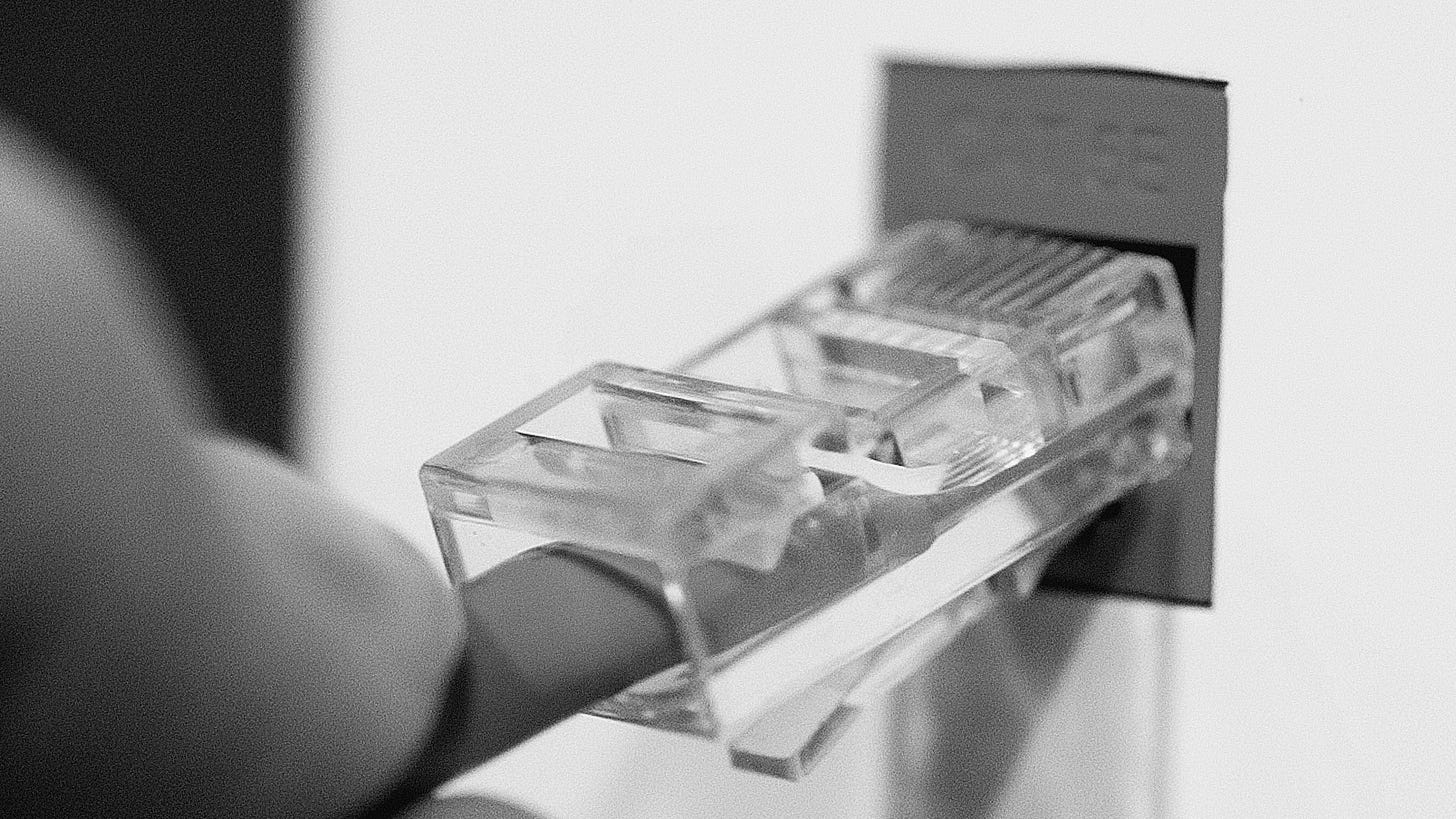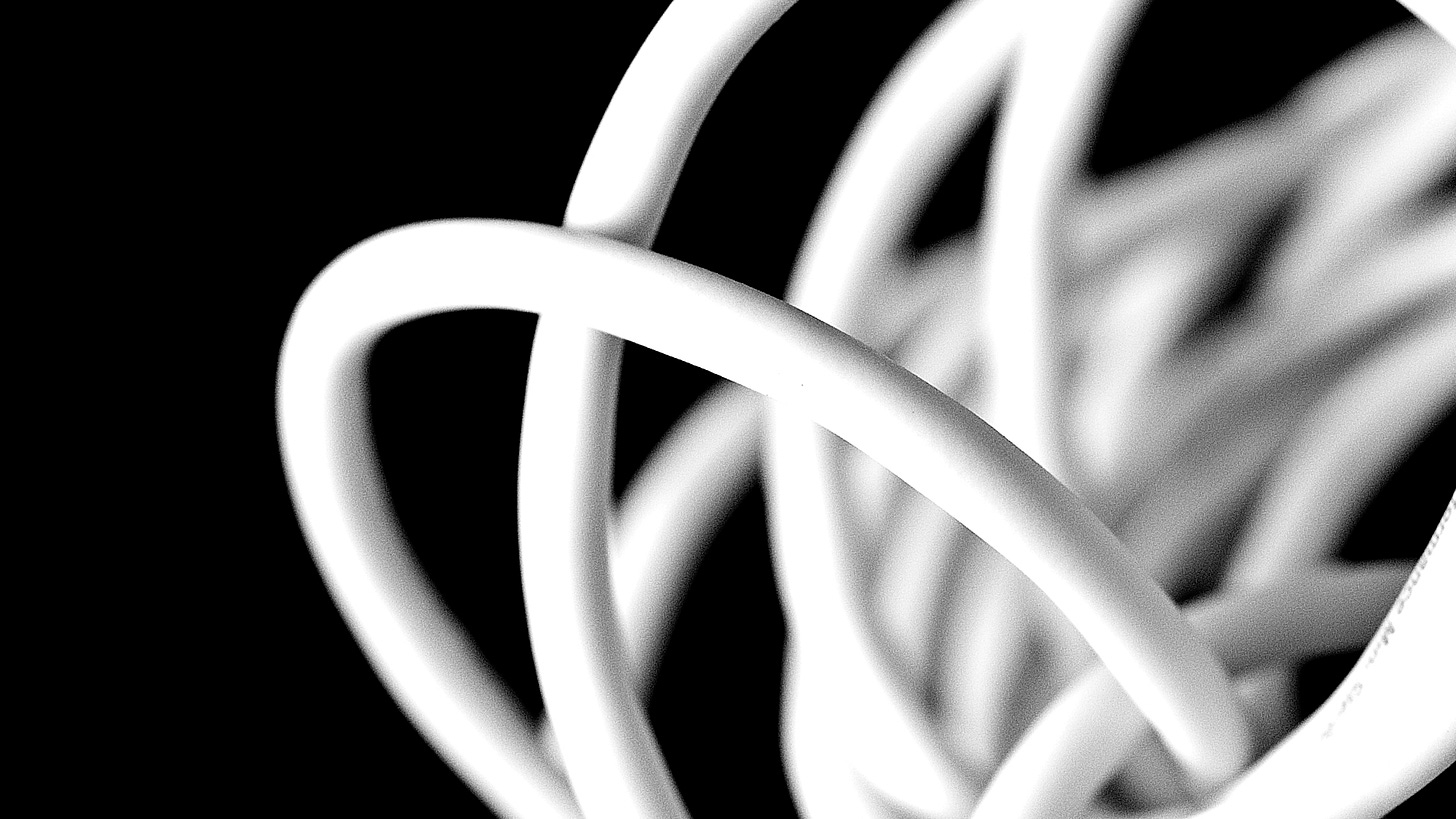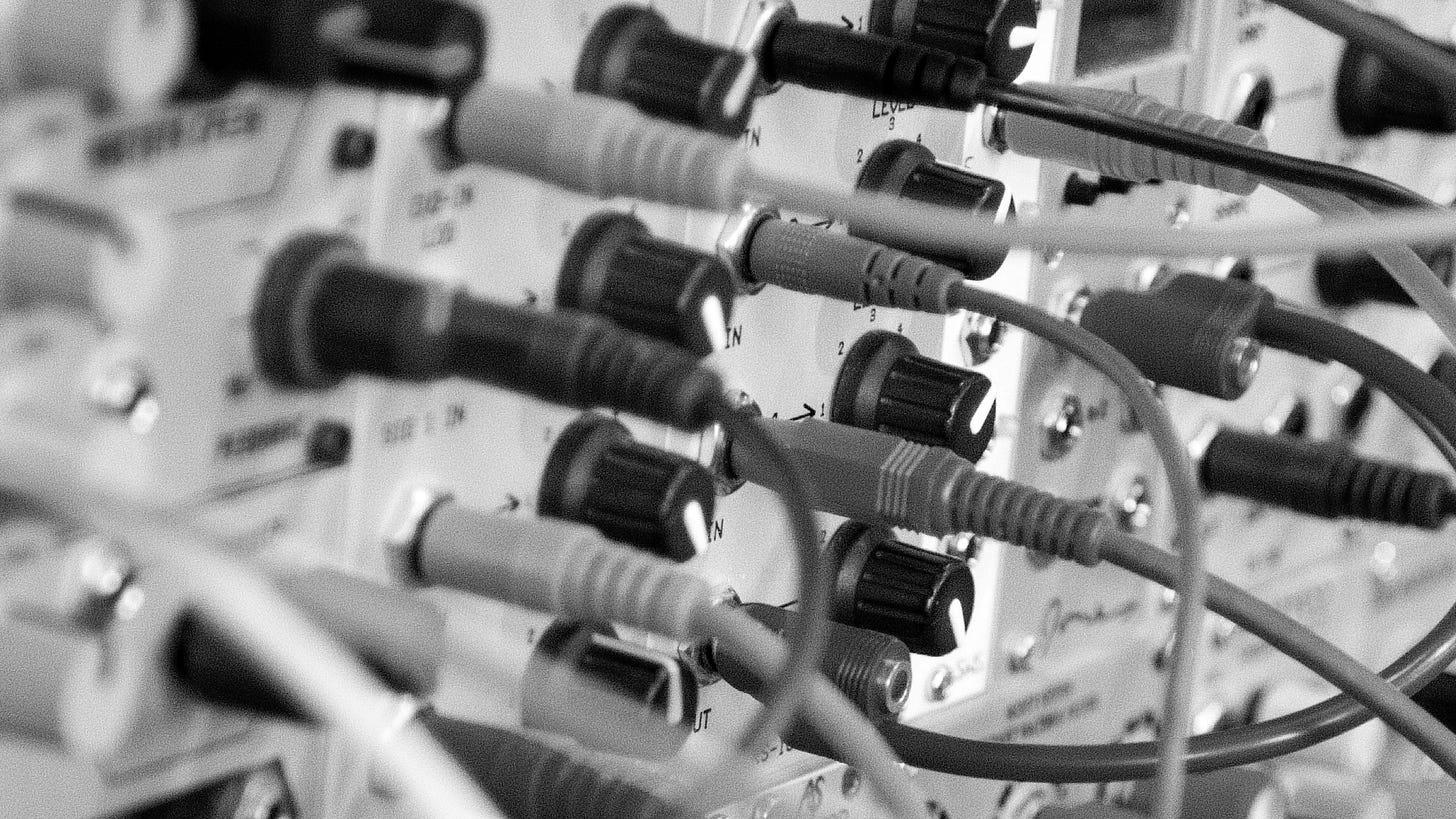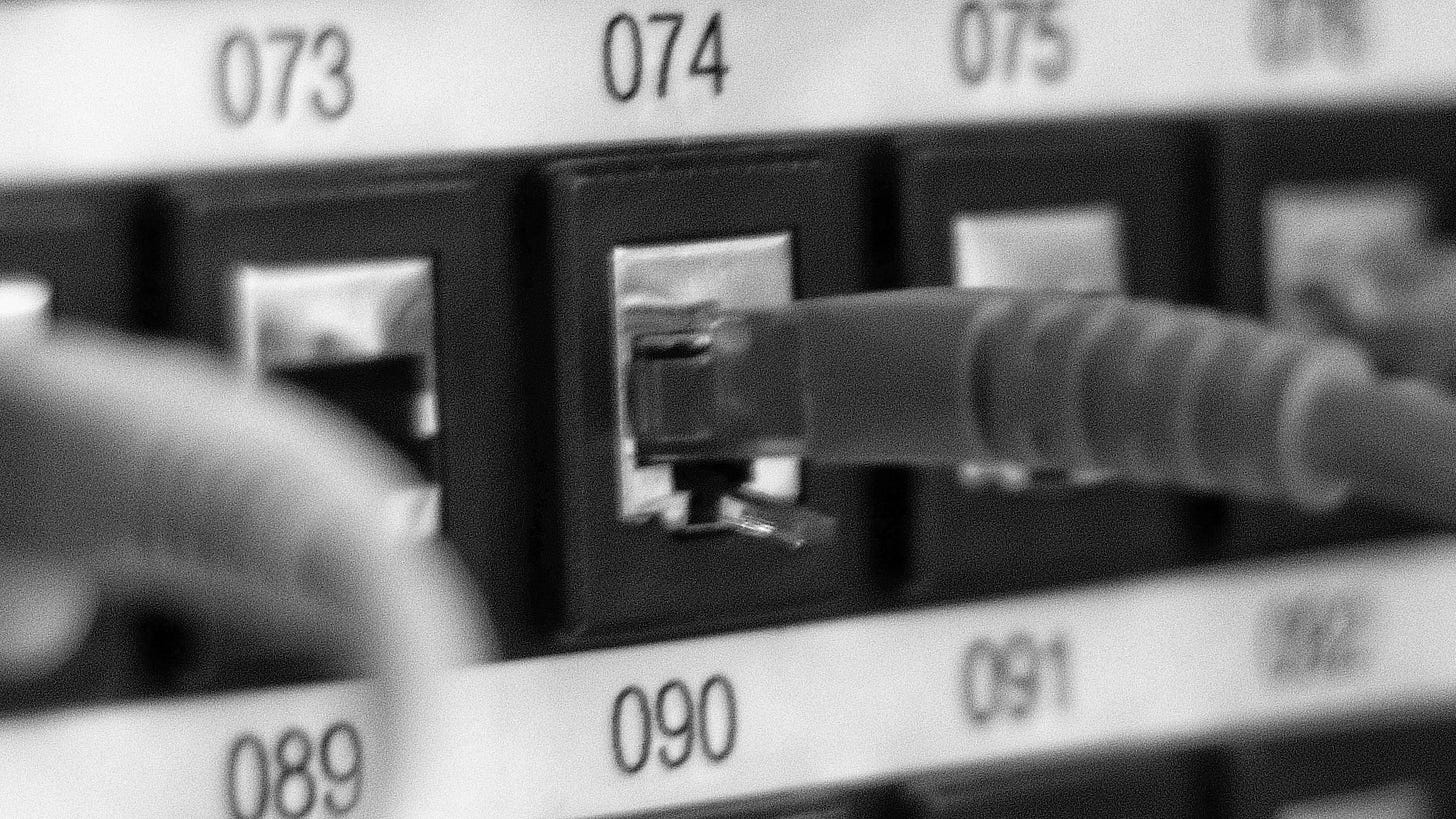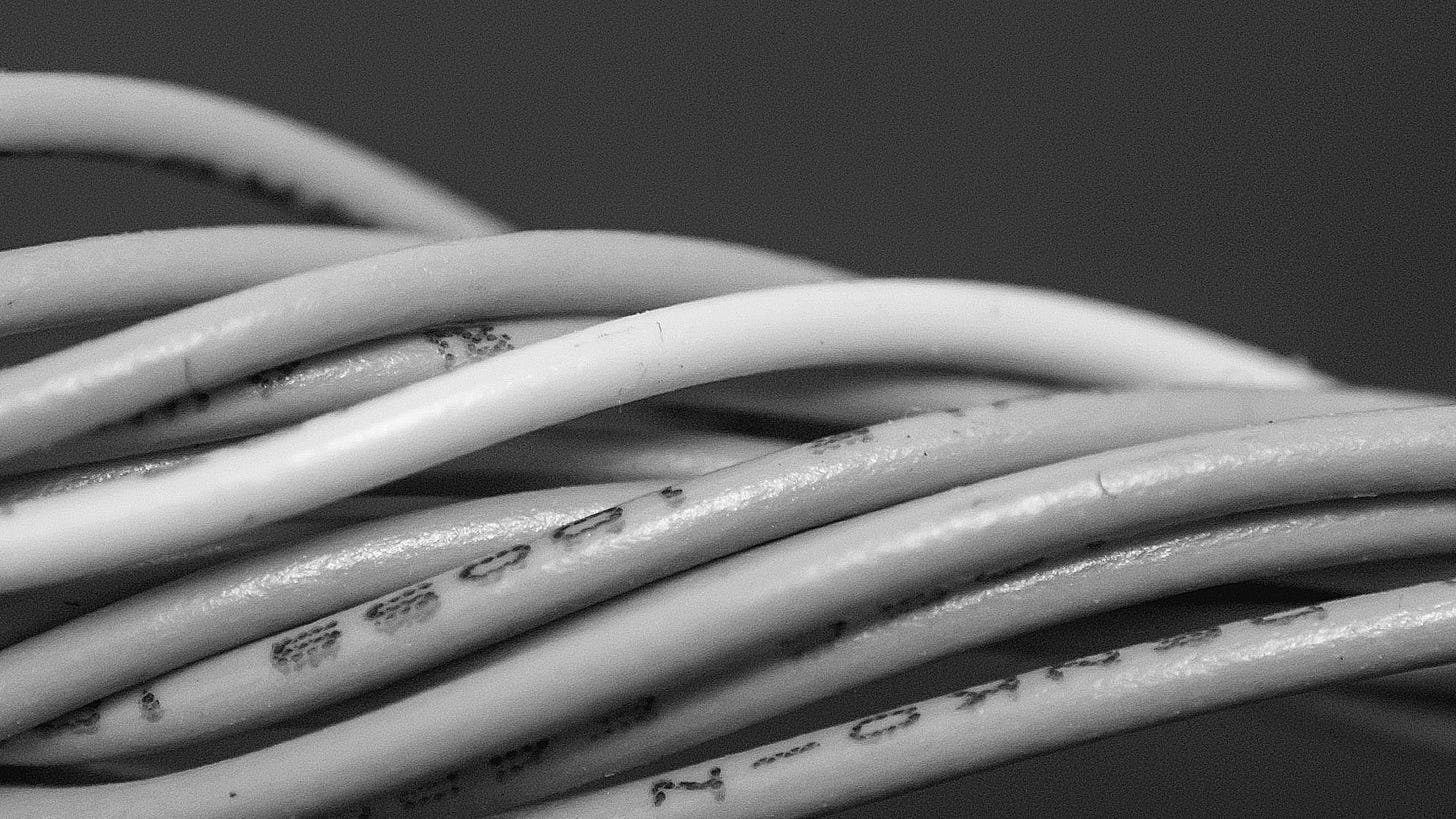The crisis of endless troughs of content, outrage-bait, attention incentives, intermittent reward slot machine dynamics, comparative quantified self-worth, static profiles demanding fixed personal brands, Zoom-fatigue, and our weakening muscle of discerning fact from fiction it’s all just. too. much. for our brains to manage.
Statistics about our declining state of mental health amid our increases in screen time are not even needed to support any of tech’s effects. Pause and take a breath. You can feel it. That’s enough.
For remedies, we’ve been prescribed to delete our apps, curb notifications, turn our phones greyscale, invest in flip phones, and look away from screens two hours before bed. Oh, and especially don’t doom-scroll or check work email (same thing) as soon as you wake up.
Whoops.
Meanwhile, the recommendations from the other extreme advise us to become more productive by upgrading our tool stacks — as if we can transform into machines, ourselves, dominating our problems with “hacks.”
Using more tech to defeat the pitfalls of tech? Nice try.
How many times have you plowed through your timed app limits in the last week?
Over the years, countless books and campaigns such as the Social Dilemma raised awareness and proposed the aforementioned solutions.
But I ask:
Has anything meaningfully changed over the last decade? No. Really.
What’s changed?
We now have TikTok. Screen time climbs higher. Our meditation apps interrupt us with push notifications urging us to return to their feed of more video content. A three year old is now impressively proficient with an iPad — good luck snatching that thing out of their clutch. Sludge content, unafraid, pleases our needs for stimulation. Hell, “brain-rot” is a phrase we don’t even question.
Meanwhile, techie public intellectuals pivoted to “AI safety” and now promote their podcasts and newsletters on the very platforms they were catastrophizing just a few years earlier. With the emergence of AI, we face an onslaught of new issues (consent, copyright, fictitious content, etc.) without ever adequately rectifying those which came before.
Most dramatic yet least questioned, AirPods and wearables continue to break sales records... Our tech is increasingly on and inside of our bodies. So much for “getting away.”
Via digital trackers, we willingly give away our heartbeat, body temperature, and DNA to companies without an iota of control. And we’re the ones paying them.
Whoops.
We’re heading in the opposite direction we’ve been proposing. We are no more better off since we’ve coined “the tech-lash” a decade ago.
Our interventions have failed.
Or did we even try?
With such a lack of any meaningful progress, perhaps we require a wholly different approach if we’re to experience a healthier, happier and more productive life with our devices, screens and apps.
Perhaps, we must mature our discourse beyond fighting against these issues, to accepting them.
It’s a strange word choice and seemingly antithetical to what we want, but bear with me...
Instead of unplugging, how may we become more mindful in embracing and strengthening our ability to live with these consequences?
Only then can we find better mastery with and over them.
You are not weak.
The Ignorance of Unplugging
In Digital Minimalism, one of the most popular books on developing a better relationship with modern tech, author Cal Newport writes,
“People don’t succumb to screens because they’re lazy, but instead because billions of dollars have been invested to make this outcome inevitable.”
To overcome this malicious investment against us, Cal urges readers to digital detox. Simply spend a month away from your screens to discover new hobbies and take up journaling.
Let me be clear: I could not agree more with this advice. We all need to touch more grass (or mosh), kindle both passions and meaning, establish new rituals, and engage in a habit of reflection. Absolutely. Yes.
But! I for one refuse to accept these (“detoxing”) tactics as comprehensive or sustainable in our current moment and, further, the moments which come next.
Unplugging is a short-term, unsustainable, selfish and frankly, privileged approach to the downsides of our everyday technological struggles.
While billions of “bad” dollars are spent hooking, billions of “good” dollars are spent onboarding more and more and more people around our planet online. Countries, states, townships, schools, hospitals and non-profits are all ensuring that every facet of society is accessible via a smartphone. This includes countries, which have historically been left behind — connection begets prosperity whether we like it or not. As a result, employment, banking, housing, education, dating, healthcare, you name it — the foundations of any functioning society are now only accessible online.
It takes a certain privilege to opt out.
I’m not alone in this controversial perspective.
Author and consultant, Venkat Rao, calls such harsh disconnection, “Waldenponding,”
“I'd like to try living off the grid for a bit in a log cabin, myself, for a summer or something. I'm also on board with trying and adopting experimental rituals like a no-devices sabbath day...
But as an attitudinal foundation for relating to society and technology, Waldenponding is, I am convinced, a terrible philosophy at both a personal and collective level.
It's a world-and-life negation. A kind of selfish free-riding, tragedy of the commons: not learning to handle your share of the increased attention-management load...”
[...]
“The way to manage your attention is not to ‘unplug’ or do some sort of bullshit Classical Liberal virtue signaling crap of ‘I only read Ancient Greek authors’ but to be sensitive to your current mind size and consciously target the zone you want to be in...”
What is it (Exactly) You’re Fighting Against?
New organizations are popping up to fight this “media addiction.” This is the equivalent of picking a fight with air.
I suppose these orgs don’t have an issue with cave paintings, which are just another form of social media. Books? Ok. eBooks? Ok. Book reviews? Ok. A book review on a social platform? Someone’s comment on a book review? A number which represents the number of people who agree with that book review?
Where exactly would you like to draw the line between kosher and caustic?
Concern and attention is a noble effort, but they — and we — require specificity and nuance in such conversations. Otherwise, we get more noise without change. This is where we are now.
What exactly makes cave paintings, art galleries, newspapers or bulletin boards acceptable forms of social media and how do we distinguish good vs. bad, and healthy vs. unhealthy? Is it algorithmic rankings geared toward engagement, no age minimums, endless feeds, abundance of metrics, growth-for-growth-sake business models, or something else? Pick those, not “media.”
We’ve got a lot to improve. But righteously banning, outlawing or withholding social tech and media means stripping away the support for millions dealing with mental health, alcoholism, religion, chronic illness, cancer, divorce, sexuality, or child raising.
This isn’t an all or nothing deal. Unplugging is a false binary.
That’s the computer thinking spreading amongst us like a virus. The very limiting 0’s and 1’s. Black and white. Disconnect and thrive or stay plugged in and rot. Why is it all or nothing? We are not machines — we’re better at thinking than that and than “them.”
Also, not for anything, have you actually tried leaving the house without a phone recently? How is that supposed to make us less anxious?
What’s Left Behind For Others
A frequent proposed resolution to this conundrum is: “Adopt self-restraint and create better habits.” Love it. How may we begin treat the Internet as a tool like a fishing rod? We only fish when we’re “hungry.”
The prickly flaw in this thinking is that unplugging does not reverse any psychological damage already inflicted upon us, nor does it eliminate the opportunities for others to also fall trap when you’re unplugged. It’s all still there awaiting everyone else.
Further, unplugging — or the failure to do so — now installs shame. The more we preach “better habits,” and the less we adopt them, the worse off we feel. Starting the day checking email in bed somehow feels even worse when the world is telling we’re a loser for doing so. Judgement compounds our predicament.
When our “tech issues” are no longer contained to a device and spill out into our streets affecting us physically, our solutions must not just revolve around the technology itself (i.e. removing it), but addressing the human conditions first and foremost.
Human intervention, not technological elimination.
As Chris Dancy, the author of Don’t Unplug: How Technology Saved My Life and Can Save Yours Too puts it,
“We don’t need a virtual reality, we have a reality.
We don’t need innovation, we need compassion.
We don’t need to fix the problems of the world with technology, we need to fix technology with our human spirit.”
(Please) Don’t Forfeit Your Agency
Now at this point, all of these arguments may be coming off as tech-defensive, algorithmic-apologetic, or straight up nihilistic — i.e. Just give up. Accept this dystopian state.
However, this is not an admittance of defeat, but a realistic approach for empowerment.
What if unplugging is the running away?
I struggle to accept the fact that our minds are too weak.
That’s defeat.
How may we learn to live with?
How may we learn to live in light of?
And how may we learn to live despite?
This holistic approach honors our capability, not diminishes it. We can both adopt schedules to unplug and develop the strength for healthy online engagements in this environment.
We can work towards limiting screen time and accepting our new digital appendages and their effects, not trying to sever or ignore them.
Exist, not exit.
I’m no transhumanist or accelerationist, but I am however interested in adaptation and resilience over rejection and denial. We could be a lot happier, healthier and again productive if we allocated a fraction of our time and energy on conditioning ourselves to new environments and ideas, instead of fervently stressing to avoid them at all costs.
This is not tolerance, complacency, minimization or desensitization, but acclimation. Acclimation to better situate ourselves, reclaim control, and make more sustainable decisions with our technology. The shit’s not going anywhere clearly.
Are we playing the victim?
Instead of pointing out, “What tech is doing to us...” what if we asked, “What are we doing to ourselves?”
This past year I ate at a restaurant which placed cute, chest-like boxes on each table. It was a gentle, decorative nudge to place your phones in there while dining. I loved it. Past tense. After the third time eating there, I thought: “How fucking grim.”
That we’re reliant upon a restaurant to remind us it’s rude to text in front of family, friends or a date is a grave signal of our moment.
We’ve relinquished any sense of responsibility.
We have more agency here than we think.
This is on us. Not restaurant decor.
Are You Aware?
What we require here is incredible, incredibly nuanced: judge-less education and discussions to identify ways to live with, not against this “magic.”
Yes to detoxing, hobbies, journaling, grass-touching, self-restraint and better habits. And...
We need an honest embrace of our experiences — not pretending as if we can run fast enough away from our tech-drenched reality. It is unnerving — like any change is — but I do wonder if our panic stems from an outright collective (ineffective) rejection of a future we’re already barreling towards.
Instead of opting out of social media, how can we use it to connect and form relationships with figures or ideas we never before had access to?
Instead of mourning our sense of direction, how can we use our map apps to seek out tiny shops and cafes for a better sense of locality and sense of neighborhood in cities?
Instead of falling into endless content holes, how can we congregate and self-teach ourselves material which was once worth tens of thousands of dollars behind an ivy academic wall, and is now free on YouTube this very second?
These are options. We forget we have them.
Investing in a e-ink phone without Google Chrome or Spotify may not be as helpful as we hope, which let’s be real: it’s core functional value is a status flex. Sure, turning off some notifications from our apps may help, but that won’t prepare us for the next 30 years of innovation.
What we need is realistic digital and media literacy from frank confrontations and discussion.
Contemplation will ideally spur more blunt conversations and further, healing from our wounds on the battlefield of attention and against tech overlords. Only then can we actually begin to move forward.
We need human compassion and acceptance more than we need a digital sabbath. And yes, maybe a digital sabbath can in fact get us closer to that presence.
From pornography panics, context collapse, misinformation, decline of institutional trust, post-truth narratives, infobesity, tribal mob mentalities, incentivized reactions, recursive feedback loops, to the decay of a shared monoculture and loss of cultural synchrony, algorithmic segmentation, exhausting social performances, audience capture, and the death of the expert...
Agency will come from curiosity, questioning and understanding — not removal, ignorance, or denial.
As media theorist Douglas Rushkoff puts it,
“The question should not be about how humanely our technologies program human beings, but about how well human beings can program technology.”
We are in control. That is, if we still want that.
In his latest work, Program or Be Programmed, the 15th anniversary edition, Rushkoff proposes four methods to avoid being programmed by digital technology, and to instead become the programmers of our world.
What we require is to:
Denaturalize power by revealing social constructions which are ideas we merely invented, and are not pre-existing laws we must adhere to
Trigger agency by reminding ourselves how digital environments offer us endless possibilities of access, authorship and agency, not constraint
Resocialize people by making it easier to ask for favors, establish rapport or build solidarity, instead of seeing people as members of opposing tribes — we’re all on the same team
Cultivate awe by seeding styles of education or art that engender a tighter embrace of the moment
Our strength should not be measured by our ability to push away our tech, but by our ability to hold and live with tech in peace.
The opportunity (and challenge) is to embrace tech’s negative externalities as opportunities for change. Only once we can understand their biases and accept them, may we design remedies and honor headspaces to coexist with, not against this reality.
Unplugging leaves the mess behind and denies responsibility.
In the “war against tech,” maybe surrendering isn’t a failure, but our only chance at finally finding peace.



